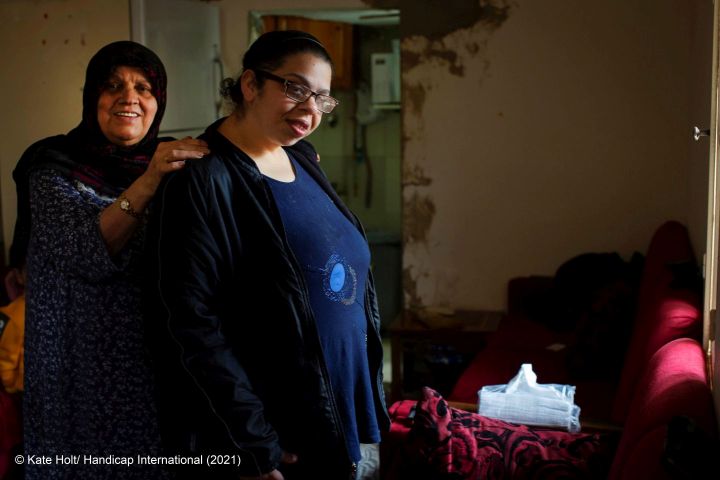| Author: | Eva Maria Fischer |
| Date: | 26. March 2025 |
A political declaration on the use of explosive weapons is intended to strengthen international humanitarian law
When bombs or grenades strike residential areas, 90% of those killed and injured are civilians – as figures of the NGO Action on Armed Violence have consistently shown over a period of ten years. Even with the best intentions, this recurring and dramatic situation over the years cannot be in accordance with international law. International humanitarian law prohibits the deliberate targeting of civilians, yet this seems to be increasingly commonplace in many current conflicts. At the same time, IHL mandates the distinction between civilian and military targets and the proportionality of every attack, even in the case of legitimate strikes on military objectives. Can 90% of civilian casualties be considered proportional? Definitely not!
In response to this pattern of harm, and largely unnoticed by the political and humanitarian spheres in Germany, a political declaration was adopted in Dublin at the end of 2022 after lengthy negotiations. Its aim is to “strengthen the protection of civilians from the humanitarian consequences arising from the use of explosive weapons in populated areas (EWIPA).”
With this blog post, I would like to invite readers to take a closer look at this declaration, which has already been signed by over 80 states, including Germany, a country that has shown significant commitment throughout the negotiation process. I also want to highlight three inspiring women from Syria and Ukraine who, together with HI as part of the NGO network INEW, are advocating for the consistent implementation of this declaration.
The political declaration on EWIPA
“All that civilians in a conflict zone can do is focus on survival because there’s no possibility for a normal life with plans, aspirations and achievements. The sense of peace and security is taken away and replaced by fear and uncertainty. And the insecurity is even bigger for women like my sister and myself. When civilians are bombed it’s not only their lives, cities and homes that are lost but also their future.”
Powerful words from the young Syrian Nujeen Mustafa, who endured relentless bombardments in her hometown of Aleppo before embarking on a long and perilous journey to Germany in her wheelchair – first crossing the Mediterranean in a rubber boat and then traversing eight European borders. Nujeen shared these experiences in 2022 at the conference for the signing of the political declaration on EWIPA in Dublin.
Among other factors, it was the experiences from Syria that led to the process resulting in the political declaration. The unexpectedly strong support from NATO states for the declaration – 29 NATO members were among the initial signatories, including even the United States – is certainly also linked to the experiences and stances shaped by the war in Ukraine. Today, more than two years later, we see in Gaza and Sudan – to name just a few examples – how the number of civilian casualties from bombing and shelling continues to rise.
The use of explosive weapons in Gaza and Israel since October 2023 was the main driver of a dramatic increase in civilian casualties in 2023 compared to 2022. In 2024, about 40% of all reported civilian casualties worldwide occurred in the Occupied Palestinian Territories. In Sudan, civilian casualties surged significantly in 2023 following the outbreak of conflict in April between the country’s military, the Sudanese Armed Forces (SAF), and the paramilitary Rapid Support Forces (RSF). At the same time, access for humanitarian aid to support the population remains blocked in many current conflict regions, with catastrophic consequences for the affected populations.
The political declaration must be implemented in concrete terms
For all these reasons, the central goal of the declaration is to reinforce international humanitarian law and make it more concrete through clear guidelines and practical experiences. This applies primarily to military policies and operational practices. With the political declaration, signatory states commit to critically reviewing these policies and practices through mutual exchange. While most signatories emphasize that they already adhere strictly to international legal standards, there is significant interest in concrete exchanges on what this could look like in practice – such as during a military workshop held in Vienna in early 2024 as part of the declaration’s implementation. I traveled there with Marwa Almbaed – a young woman who was severely injured in a bombing in her hometown of Damascus. The journey to the nearest accessible hospital took several precious hours, passing through multiple checkpoints. Once an enthusiastic tango dancer, Marwa now relies on a wheelchair. In Vienna, she shared her story on a panel alongside senior military officials and diplomats, addressing an audience of military personnel from various countries. She actively participated in the subsequent discussions and practical exchange forums.
When the topic of “necessary collateral damage” arose, she reminded the audience of what this term could truly mean: women, children, and men killed or injured, or destroyed hospitals. And she asked the audience a powerful question: “Who among you has ever lived with your family in a war zone?” The answer: silence.
The humanitarian commitments of the political declaration
Another key aspect of the political declaration on EWIPA is to strengthen the humanitarian support of populations affected by explosive weapons. The declaration outlines humanitarian obligations: facilitating rapid, safe, and unhindered access for humanitarian aid during armed conflicts, supporting victims, and collecting and sharing sex- and age-disaggregated data. None of these are new requirements. However, what their concrete and practical implementation under this declaration means is being explored in a series of workshops. Since 2024, Handicap International has been inviting experts from donor and affected states, UN organizations, and INGOs to these workshops. Focused on practical realities, four key topics are discussed and documented in final reports: humanitarian access, health care access, risk education and conflict awareness, and finally marginalized groups and the specific needs of vulnerable groups affected by EWIPA.
These workshops also include directly affected individuals as key experts, such as Olha Lieshukova from Ukraine. In the last workshop she openly shared her experiences of living in a war zone as a chronically ill woman: how her house was bombed, how the essential medications she relied on became unavailable, and how her husband, while waiting for hours outside a pharmacy, was struck by a rocket. He lost his hearing because he couldn’t receive timely medical care. Olha’s conclusion: “We must understand how crucial it is to maintain the operation of medical facilities during wartime and to provide humanitarian aid that saves lives, health, and the future of people.”
An opportunity to strengthen international humanitarian law?
Will the political declaration on EWIPA ever have tangible effects? Will it help restore respect for international law, which continues to be blatantly violated every day? At the very least, it establishes a platform for concrete exchange. Stimulating and, in some cases, practically applicable reports have already emerged from military and humanitarian workshops. At the first meeting of signatory states in Oslo in 2024, some initiatives for promoting civilian protection in military operations were presented as contributions to the implementation of the EWIPA declaration. However, looking at the US, already within the first days of the Trump administration, the reversal of such initiatives was announced. It remains crucial to closely monitor how shifts in U.S. policy might affect the other signatory states of the declaration.
Given the widespread current skepticism about global compliance with IHL and the ever-shrinking space for civil society, it is nonetheless encouraging that the implementation process of the EWIPA declaration has so far been largely inclusive. There is a unique opportunity in integrating the voices of those affected by explosive weapons into the global exchange envisioned by EWIPA. This approach has the potential to foster dialogue between those impacted by adherence—or lack thereof—to IHL and those responsible for its implementation. Genuine exchange has indeed been taking place, with militaries and diplomats listening to Nujeen, Marwa, or Olha with sincere interest, often referring to them in their statements.
For this reason, we continue to advocate for the implementation of the declaration—with a sense of hope that Nujeen expressed at the signing conference in Dublin: “I hope that the signing of the declaration will not be just a piece of paper – but will be the beginning of a real change! People suffering in wars around the world need it!”
Dr. Eva Maria Fischer heads the political department of Handicap International Germany. She has been working in the context of international disarmament campaigns supported by HI for over 20 years.





